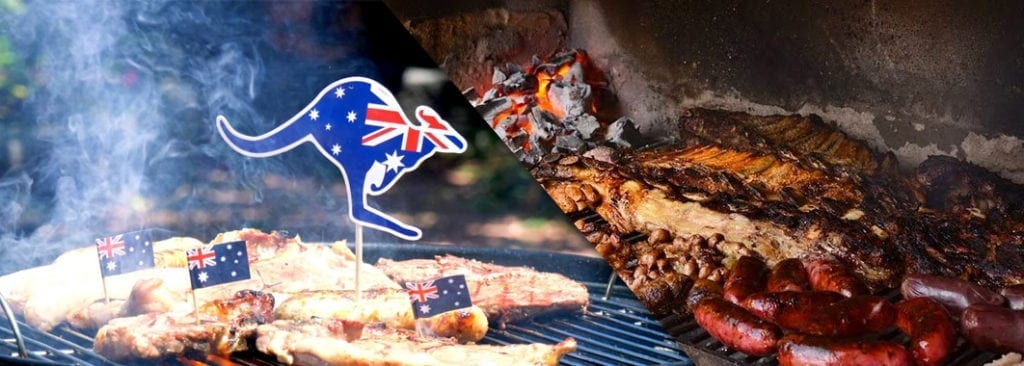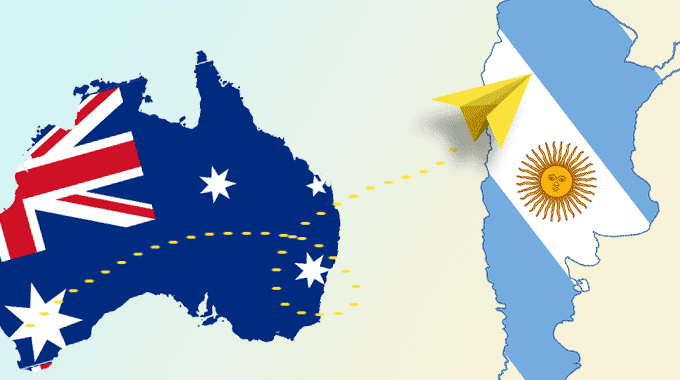Written by Cooper Geyer, a proud Australian currently living in Buenos Aires and studying Spanish at Vamos Spanish Academy.
As a guy who has lived in Perth, Western Australia his whole life, I knew that moving to Buenos Aires, Argentina was going to present a completely different way of living with a culture that is vastly contrasting to the one I grew up in. What surprised me, however, are the arrays of similarities that both nations shared culturally. I’m not saying this South American land down under is ‘ridgy didge’ but there are definitely some things that make me feel a little at home. I should mention, the things I have included in here are just my general opinion from what I have experienced whilst living in Argentina and Australia.
A Quick History Comparison of Argentina and Australia
Before we get into the two cultures’ main similarities, I need to explain the history of Argentina and Australia, and present how they are similar. Both Argentina and Australia are modern countries and were colonized by Europeans with large masses of migration to follow. For Argentina, it was Spain who set up a permanent colony in the 16th century with the British attempting to conquer in the 19th Century but failing miserably. Finally, a Federal state was formed in 1853 to 1863. For Australia, it formed its state-ship in 1901. While Australia began as a penal colony with the forced transportation of British and Irish convicts, we evolved into a monarch and finally our own country down under. Lastly, both our countries had indigenous people prior to European settlements with natives arriving 10,000 years ago in Argentina, and estimated at 60,000 years ago for the Australian Aborigines. Both these groups have had an impact on both of our cultures due to the Europeans conquering and rejecting their way of life, but both cultures are still alive today and play a part in the nations’ identities. Now with the history lesson out of the way, let’s get onto the cultural similarities!
BARBEQUE / ASADO


Aussies are known “to cook a shrimp on the barbie” and while it’s not always ‘shrimp’, or prawn as we would say, Australia has a long pastime of cooking a ‘barbie’ in the park or backyard with friends or family. Australia doesn’t have one stand out meat for cooking, but who doesn’t love a good steak? Well, Argentinians certainly do and have a long culture of cooking steak along with other meats (chorizo, chicken) over what they call an ‘asado’. Now while I take pride in my country’s barbeque culture, I can say the Argentinians outdo us with their asado (barbeque), whereby the meat is cooked unlike anywhere in the world. The Argentinians cook an asado in their own style using dry heat from charcoals and slow cooking the meat until just right. The traditional style “al asador” includes the entire meat slowly roasted on a spit with a crossbar for a couple hours. Now whilst most Australians just chuck some snags on the Barbie with no specific style, it’s the gathering of people and event like culture that emanates from barbequing that both nations share. Like Australians, Argentinians don’t cook alone, the asado experience is usually with friends and family, and it is one of the only times you’ll see a man actually cooking. Argentinians will almost always drink a red wine with the asado, and while it may not always be wine, Aussies love a good drink to go with their meat, and in my experience usually a good old-fashioned beer or more hipster-esque cider.
TAKING THE MICK
As an Aussie, I can say that socially, Australia has a culture of making fun of people, yourself and pretty much everything. In Australia, people will poke fun at their friends, family or even some people they don’t even know, yet this is all in good spirit and is meant as a bit of fun. In the past, I remember foreigners taking these things the wrong way, but since coming to Argentina and meeting friends and family of my Argentinian girlfriend, I couldn’t help but realize there are a lot of banters here. Sitting at my girlfriend’s family gathering I noticed her relatives had no problem at all throwing a bit of banter around and no one ever would get offended if I gave it back, but rather, laugh it off or pour me a wine as if it really meant nothing.
LAID BACK / “¡NO PASA NADA!”
Like Australia, Argentinians are quite laid back and don’t mind a bit of relaxation when necessary. One way I found Australians were laid back was in the way we talk. When conversing with mates I found it common to say things like “no worries” or “too easy” even when things really aren’t easy at all and worrying is a natural human instinct to everything going wrong. Whilst verging on laziness at times, the laidback cultural aspect of Australia is one that is quite unique. However, one thing I noticed about Argentinians is that in their own way they definitely share this quality. Even in a bustling city like Buenos Aires, you get a feeling that time is a little slower and in fact, time and punctuality are something that Argentinians don’t really fuss about at all. I’ve noticed even in working – if work starts at 9:30AM, everyone could get there at 9:30AM sure, but 10AM is no different.
SPORTS


In Australia, sport is very big and people are obsessed with all kinds but there’s no sport that is more popular than Australian Football or AFL. While Argentinians don’t put on their footy boots and kick a few bananas in the 50, they are absolutely bonkers about soccer or preferably to be referred to as fútbol here. Almost every bar will play football games on television and whether it’s World Cup or just any national league games, people will be glued to the screen even if it’s just watching the game through the smallest TV you’ve ever seen outside an electronic store. In a way, our two countries see sports as a part of the national identity, and how well we do on the world stage has definitely helped. Whilst Australia has had arguably the greatest Cricket teams of all time producing legends like Don Bradman, Shane Warne or 52 cans David Boon, Argentina has won World Cups two times, and with Maradona and Messi to add to their list of greats. It’s also worth mentioning that both countries love a bit of Rugby and have national teams, even though Australia usually kicks Argentina’s butts, Rugby is still considered a very big sport in the nation. Lastly, Australian Rules Football is, of course, Australia’s own invention, but Argentina has too invented their own sport called Pato, which isn’t as big in Argentina but is still as unique which combines polo and basketball, which the concept is quite strange I thought. But when seeing four blokes jump on top of one man to catch a footy ball, I realize we may look as strange ourselves.
DRINKING
I hate to reinforce the stereotype, but many Aussies don’t mind a couple of drinks with friends or family. Like Australia, this is also quite an accepted activity in Argentina and it’s very common to see the adults (18+) enjoying drinks like Malbec wines socially at different hours, and you get a sense that it’s not something that is looked down upon, but rather embraced as a part of the culture. Also, like Victoria Bitter in Australia, Argentina has a national beer called Quilmes, which is a lager and can be found at any bar, restaurant or kiosko throughout Buenos Aires.
THE ITALIAN INFLUENCE


Italians have had a huge impact on both Argentina and Australia’s cultures with Italian being the second most spoken language in Argentina and third in Australia.
When people think of Australia, Italy certainly isn’t the first thing that comes to mind. However, whilst early Australia was influenced heavily by the UK, post World War II brought in large masses of Italian migrants to the country, and this has had an impact on the culture in its own way. The Italians brought a food and drink culture as they settled in neighborhoods like Fremantle or Carlton, and adding their own unique flavor. The introduction of coffee – and well done at that – was brought by the Italians, so today Australia can thank Italy for our wonderful coffee culture that made Starbucks completely a flop. In terms of food, basil and minestrone were once a very exotic concept in Australia, yet now Italian ingredients and foods are a part of everyday cooking.
In Argentina, Italians flocked to the country like mice to cheese, and it was through this 1800s post colonization migration that a lot of Argentine culture began to flourish. Just walk through the streets of Buenos Aires and you’ll notice the Italian-named streets and suburbs like Palermo or Plaza Italia. Otherwise, talk to the locals who speak Spanish with Italian intonations, say ‘chau’ (caio) for goodbye and use hand gestures like their grandparents from Italy. Whilst there are many Italian restaurants in Argentina, it’s in the Argentinian cuisine that you can see this blatant influence. For example, the Argentine version of pizza, which is like the Italian but with a thicker crust and a lot more melted cheese. And like Italians, Argentinians are crazy about their red wine and cheese, and you’ll find most dishes have a sprinkle of garlic somewhere.
LANGUAGE
Of course, Argentinians speak Spanish, so I’m in no way suggesting that we speak the same language, but I can say that there are quite some similarities in the way our post migration takes on each of our respective languages. It was because of England’s colonization of Australia, we Aussies speak our own unique laid-back version of English, and this is very different from the rest of the English speaking nations of the world. After learning Spanish at Vamos Spanish Academy, I noticed Argentina’s version of español also has some differences from their mother nation of Spain and the rest of Latin America. For starters, Argentine Spanish and Australian English are quite informal in their approach to the language. For example, in Argentina, the formal version of you, ‘usted’, is not as typically used in Argentina. In Australia, the informalities come mainly in the way of slang, such as by which the ends of words are clipped off and shortened, and sometimes added with an –o, for example, a barbeque is a “barbie”, an afternoon is “arvo”, a bottle-shop is a “bottle-lo”, and our much-loved football is “footy”. Speaking of slang, Argentina has their own list of unique words and phrases that separate them from the bunch. For example, Argentinians will say ‘che’ for mate and many times ‘¿Cómo andás?’ (how are you going) rather than ‘¿Cómo estás?’ (how are you doing). Something else to mention is that the slang phrases that are common, such as ‘estar en el horno’ (to be in the oven) which is to say when someone is in trouble, just like in Australia where we have phrases like ‘to be up shit creek without a paddle’.
So when visiting Argentina as an Australian, or visa versa, you may feel a bit of culture shock, but know that these similarities will help you relate and feel a little more at home.
Start your Spanish Classes Today, choose:




